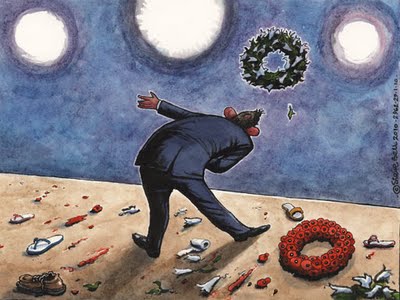Here's a very quick test of just how soon we forget: who wrote the following and about whom?
HIS bright blue eyes stare out at us beseechingly.
A gorgeous, blond-haired, blue-eyed tot with a heart-melting smile.
If you answered with anything other than the Sun and Baby P, or Peter Connelly, as he is never going to be known, then I'm afraid you're wrong. It does however already seem so long ago though, doesn't it? A furore where the fervour has dissipated often later seems to be unreal when it's recalled; were we really that outraged, that angry? After all, it's not us, detached from the case who end up being personally affected, just those with the misfortune to be connected, however tenuously, who find themselves trapped within the vortex of a nation's temporary indignation. Social workers are still getting used to the voluminous amount of new recommendations as advised in Lord Laming's report on Haringey's failings, not to mention the increased workloads after councils across the country played it safe and took more children into care than perhaps needed to be. As for the Sun, well, one of the front pages from during their campaign took pride of place in their 40th anniversary celebrations.
I've gone over this before, but one of the most telling contributions at the time was from Martin Narey, the head of Barnardo's, who suggested had Peter survived he may well have grown up to be the "feral yob" of tabloid nightmares, condemned and castigated without a thought as to what made him. It was part of a speech which was intended to provoke, which is what it did, but it has also now rung almost too true. The case of the two brothers who committed their crime in Edlington could almost be the inverse of the Baby P case: there, an innocent child killed and tortured by those meant to be taking care of him; in Edlington, two "brothers from hell" torture and almost kill two other young boys. On the one hand, the angelic, on the other the demonic. The biblical implications of referring to the unnamed boys as the "devil brothers" is not openly alluded to, but it is there if you look deep enough: "the battle" between good and evil itself seems to be only just below the surface.
And as then, a similar political battle appears to be under way. Both examples of our broken society, of the failure of the state to protect children, with a familiar number of opportunities to intervene missed. According to David Cameron, not just an "isolated act of evil". Michael Gove described it, while calling for the full serious case review to be released into how social services dealt with the family, as "unspeakable evil". The Sun in its leader calls for the review to be released as well, but perhaps there's a clue to its real motives in the actual report's first paragraph:
THE Government was last night urged to publish the full report into the "Devil Brothers" case and shame the bunglers who allowed the savage attack on two boys.
The bunglers? One of those awful words which only the media use, and one which was put into repeated usage to describe Sharon Shoesmith, head of child protection at Haringey council when Baby P was murdered. And there is the other obvious parallel with Baby P: like then, we have no actual names to put to the individuals whose actions we have read about it. Then it was because there was another court case going on at the same time involving Peter's mother and her boyfriend, with their identities needing to be protected to prevent prejudicing that separate prosecution; here it's due to the judge quite rightly concluding that there was no public interest to be served in the brothers being identified. One suspects that it might have been different had they "succeeded" in killing their victims, like how the fact that everyone knew that Child A and Child B had killed James Bulger perhaps influenced the removal of Jon Venables and Robert Thompson's anonymity. With everyone in the Edlington case behind a shroud, the same never applied. And hence, because we don't know who anyone is, there's no one we can personally blame. The social workers who failed Baby P then became the natural scapegoats, even though they were hardly the ones that personally killed the blue-eyed tot. Without names, it's impossible to keep the story going for long: by changing the emphasis from the "devil brothers" themselves onto "the bunglers" they might just give it a longer shelf-life.
Cynical? Certainly. The Tories' reasons for calling for the release of the case review are purer, but not by much. They know that there's political mileage in embarrassing the government yet again, even if it's unlikely that anything will be achieved by its full publication. It doesn't seem to matter that the NSPCC have recommended that while executive summaries of the case reviews should be released, they oppose their release in full "as sensitive information must be kept confidential to protect vulnerable children."
That we are so quick to ascribe evil to the actions of children is itself a cause for concern. This goes far beyond whether those responsible understand the difference between good and bad, which was so hotly debated during the trial of James Bulger's killers. It goes to the heart of our own relationships, our own feelings for our offspring, which have never been so conflicted. We seem caught, not between the dichotomy of angel and demon, but between small adult and friend, and inferior and threat. We hug our own tighter, while pushing everyone else's further away. Until we're willing to unravel just how we've become so insecure about our own successors, we're likely to continue refusing to admit that ultimately the blame, if we're going to lay it at the foot of anyone, is with ourselves. Labels: abuses by tabloids, Baby P, crime, crime policies, Edlington brothers, James Bulger, media analysis, media coverage, Scum-watch, Sun-watch, youth crime

